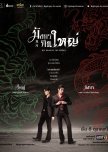
Because this show is silly.
And I don't mean that it's trash or that it's lightweight or that it's fluffy (you could argue it's all those things). I mean it's deeply deeply silly, from its basic premise to its unfolding plot to its source of conflict.
A brilliantly-cast Cat plays L, a feline that turns into a man. L tries to act too. This is not pretty. Hopefully the cat can give him some pointers while he's on set. Seriously, this Cat Sunbae is brilliant and actually looks like L. Except of course that Cat Sunbae can act.
The cat is taken in by an aspiring webtoon artist Kim Sol-ah (Shin Ye-eun). Sol-ah behaves like a 12 year old mostly, simpering and floundering and fulfilling every rant I ever made about Korean dramas infantilising their female leads. Shin Ye-eun is good here, I stress. It's the part she's playing that I don't like.
Sol-ah takes in the Cat (she renames it Hong-joo) to help out the man she's been crushing on since highschool who inherited the Cat from his recent breakup (or did he?). At one point we find out why her crush bailed on her in the past and it's very very silly (are you sensing a theme).
Hong-joo found out he could become human as a kitten when he turned into a child in her presence. The show then delights us with scenes of her as a full-grown adult with an adoring child. He then grows up, becoming a large man who follows her around, listens in on her conversations, changes into a human in her bed at night, pervs on her while she's changing, and generally behaves like a huge creepster. The first few episodes are basically a horror film with weirdly upbeat music.
Uncertain as to whether it's about bestiality, paedophilia, or a delightful romcom about a woman and her stalker, the show kind of embraces all three.
Sit back, relax and enjoy new conversational material such as, "Can a cat consent?", "Is it stalking if she let him into the house in his cat form?", and "Is it romantic if he imprinted on her when he was a baby and she was a full-grown woman?".
Or just suspend all your disbelief, turn off that squidgy thing in your head that won't shut up, and embrace the silly. It's up to you.
I couldn't. I'm out.
Was this review helpful to you?

This review may contain spoilers
There was a lot to like about the first season of this Chinese show about vampire Li Shi Ya (Zhang Yu Xi) and her love affair with tasty human Jiang Zhi Hao (Xing Zhao Lin) - despite the wooden acting, awful dubbing and overall cheapness.Season 2, however, throws most of this goodwill away with a terminal case of noble idiocy from which it never recovers.
I have never read the Manwha Untouchable so don't know how much of this plotline is based on the source text. A lot of the developments in Season 2 felt like retcons - and poorly thought-out ones at that. But in the end, it's the noble idiocy that stakes this through what was left of its heart.
R.I.P.
Was this review helpful to you?

The plot is far too sparse; acres of character development being leapt over in large Superman-like bounds. I can understand why this was later slated for a televisual adaptation. Far more time needed to be spent on characters and background to make this work. In some cases, as with the boys' absent parents, this lack of insight worked as it further highlighted the boys' isolation and feelings of abandonment. But in others, it made people's behaviour inexplicable and led to some confusion.
Others may find the ending tragic (and it is). I just find it bemusing and somewhat random. Overall, this is a sad film about very sad people. But that's Thai BL.
Was this review helpful to you?

Maybe it didn't. Maybe it had different writers, different producers, a different production company. Maybe it came from a strange, horrible parallel universe where What The Duck was dark, twisted, disturbing and grimly unfunny.
Not that What The Duck's humour was its best quality. To state the obvious, some of season 1's most powerful moments were not typical campy Thai BL moments involving confused schoolboys, a Boy Sompob OST and a cut to a fish tank. Parts of season 1 were dark. But they were dark in a thoughtful and intelligent way that suggested the writers understood the theme they were trying to explore.
This season's darkness is shallow, almost trite, in its obvious shock value - a kind of second-rate gay soap opera designed to horrify you into watching more.
Assault,
Rape.
Abuse.
Incest.
It does not make me want to watch more. It makes me want to drop it. Which I have.
What a disappointing ending to the series.
Was this review helpful to you?

One of the things Seung-ho is known for is choosing projects with sensitive, multi-layered male leads and strong, three-dimensional female leads with their own arcs. No female lead in a recent Yoo Seung-ho drama has been there merely to propel the male arc's lead or serve as an accessory. Strong female leads are almost a part of his brand.
The Memorist continues this trend by having a good mutual partnership between Seung-ho's telepath Dong-baek and the profiler, Han Sun-mi. Capable, intelligent, respected and extremely competent, Se-young's character has her own connection to the plot independent of Dong-baek and serves an equal role in the text to his own. This is extremely rare for this genre (and for kdrama generally). And, if it wasn't for the weaknesses of the plot, direction and editing, it would almost be enough for me to persist with the show.
These are two excellent actors doing their best with the material. It's just the material itself that's the problem.
Unfortunately, The Memorist just isn't that interesting. The show is dark - so dark sometimes that you can barely see what's happening - and badly edited, with things moving from action frame to action frame as though it's still a comic book and not a live action version. The characters remain undeveloped at episode 8, with little time given to them as people. To some extent, this is deliberate as Dong-baek's ambiguity is required for several plot points. But it doesn't add to the show's watchability if we can't connect or feel invested in these people as characters.
By episode 8, the show consists of our protagonists chasing a smirking psychopath around in the dark. And while I would usually persist just for Seung-ho and his badass female lead, I am unfortunately bored. Worse even than that, the show has a voyeuristic violence against women problem - a common issue with this genre. It's unfortunate for it that I am very tired of crime shows torturing women for their viewer's pleasure, or for them perpetuating the myth that it's strange psychopaths in the street we need to be concerned about. The real threat to women is men they know and it's about time dramas started acknowledging that.
Having a single strong female lead is not enough to overcome the victimisation of every other female character and by episode 8 this is becoming a real problem.
And so I am dropping the show and hoping Seung-ho's next endeavour is more to my taste.
Was this review helpful to you?

Just the most fun you will have watching a kdrama
Maybe at some point I'll come back and write a proper review of this hilarious comic action parody about a vigilante named Skunk who steals back Korea's artefacts from dastardly villains.For now, I'll just say - it's the most fun thing I've watched in years. With a perfect mashup of comedy, action movie parodies, well-directed fight scenes and a boat load of tongue-in-cheek humour (and okay possibly a smidge too much patriotism), Stealer is a ride that you won't regret taking.
The longer review will probably note the second half is maybe not as strong as the first. But who cares, really. It's a hoot.
Was this review helpful to you?

The vampirism of the female lead Li Shi Ya (Zhang Yu Xi) is not particularly well-mythologised but is of a peculiarly no-muss, no-fuss kind. She feeds off energy through physical contact so is thrown for a loop when she gets a taste of the life force of the seemingly-delicious Jiang Zhi Hao ( Xing Zhao Lin), who is an extreme germaphobe that avoids all physical contact.
The acting of both leads is particularly woeful and the atrocious dubbing did not help. The budget is so obviously tiny that even the set dressing looks cheap and the leads seems to wear the same outfits for days on end - a particularly bizarre decision for a female lead who's supposedly a supermodel.
There is, however, a certain charm to the male lead's earnestness that makes you understand why this vampire model falls for him. The show also regularly subverts the standard romance tropes of Chinese dramas in a way that's refreshing. Shiya is rarely coy about her desire to touch her "prey" and his consistently-mature response to this seemingly-sex-crazed stalker in his life is extremely appealing.
I could have rated this lower but it was slightly better than the sum of its parts.
Was this review helpful to you?

Cliched and generic, easy early drop
What a waste of Shin Ha-kyun's talents.His character is a bland cliched "tsundere man with trauma", who takes over an audit team at a construction company and tries to whip it into shape. He is of course pursuing his own secret investigation into [INSERT CHILDHOOD TRAUMA DUE TO CHAEBOL CORRUPTION HERE].
He's joined by corrupt dimwit Lee Jung-ha, who specialises in the art of talking emphathetically to people who were totally going to dispose of a dead body in a reservoir to cover up their death but had second thoughts only when they realised they were still alive.
Boy I'm glad he's here to humanise his new robotic, cynical boss, who we're told must be "really lonely" because he actually does his damn job.
The only thing missing is for this Candy to be a woman so he and his new bromantic boss can get married at the end.
Forest of Secrets this is not.
I'm out.
The acting powerhouse that is Shin Ha-kyun deserves better.
Was this review helpful to you?

I'd explain what happened in the first episode I watched but none of it made any sense. And, in possibly a worse criticism (considering the genre), the sex scene was clunky and, well, unsexy. At least KinnPorsche's sex scenes were genuinely erotic (as long as you didn't think too hard at the relationships and circumstances around it) but the one that underpins this episode is just flat out badly written, acted and directed.
I didn't know why these two men were having sex. Nor why one of the main characters decided he needed to remodel his bar afterwards. All I knew was that I was confused and bored and, if the former can be handwaved, the latter cannot.
So unless your commitment to watching awkward men simulate bad sex is high, avoid for now. Its not like there won't be a new version of this story next week.
Was this review helpful to you?

This has to be the most unusual BL I've seen. If you told me it was Japanese I'd have believed you and yet its sensibility is completely Korean.
Set in an alt-Korea where there is widespread prevalence of a neurological form of Monochromacy (the eye functions perfectly but the brain cannot process colour), 'monos' cannot see colour unless they find their 'probe'. How and why looking at the face of your 'probe' enables your brain to process colour temporarily is not explained, nor is it the point really. Monos dwell in a grey and shapeless world until their Probe brings it to life for them. It's questionable science but the metaphor is pretty obvious.
Yeon Woo (Yoo Jun) is a 'Mono' who never wants to find his 'Probe'. The television news is filled with scary reports of Monos going crazy and kidnapping or murdering their Probes due to their intense desire to possess them. Yeon Woo has no interest in becoming that kind of crazy. He's happy to dwell in darkness if seeing the light makes him a statistic. But when Yeon Woo meets his probe, Yoo Han (Heo Hyun Jun), he finds himself unable to stop himself from craving what Yoo Han is selling. And 'selling' is the closest word I can find to what Yoo Han seems to be doing for the first few episodes. He comes across almost as a drug dealer, giving Yeon Woo a taste of his product to get him hooked and then manipulating him into a more intimate relationship.
It's admittedly sensual and intense - or at least as sensual and intense as two moderately-uncomfortable teens can be in a narrative tradition known for its stylistic and often antiseptic portrayals of romance. And it's a pretty good metaphor for the confused and intense emergence of adolescent sexuality. But that doesn't meant that Yoo Han doesn't come across as a pusher who is slowly and deliberately building up to asking for sexual favours in exchange for a hit. It's a little uncomfortable. Before Yeon Woo knows it, and despite his best intentions, he's completely hooked on Yoo Han, although how Yoo Han feels and why he's so aggressive about being Yeon Woo's Probe is not immediately clear. And yes, that feeling of being out of control and completely at the mercy of another person is possibly also a great metaphor for first love. Yeon Woo is as unsure of Yoo Han's motives as we are but also keenly aware of just how destructive his own obsession can be.
Either way, Korea has produced a pretty deft portrayal of a first love so intense that it feels almost illicit. The two boys creep around as though they're doing something wrong, a sense not helped by Yeon Woo's Aunt who's scared of losing her nephew like she did her sister. Yeon Woo's mother - also a Mono - disappeared four years ago. His Aunt is trying to find her and keeps Yeon Woo on the move so he doesn't risk the emotional attachment that might lead him to do something crazy. In a way, though, his Aunt's determination to keep him safe and at home with her is the reason that Yeon Woo is so scared of his own emotions and his relationship with his probe. It's a fear that eventually leads him to do something drastic.
I honestly can't say how I feel about Colour Rush overall. The camera work and direction feels surreal and disjointed, lingering almost fetishistically on the faces of our two boys. The soundtrack is minimalist in a way that works perfectly but doesn't mean the soundtrack stands out. Unfortunately Yoo Han's idol actor, Heo Hyun Jun (while admittedly playing an idol) is not just wooden but hindered by his no-doubt contractual obligation to be perceived as homoerotic rather than gay. Idols barely kiss each other in mainstream Korean dramas, there's no way their management is going to let him be perceived as happy and comfortable in a gay role. Yet that's no doubt only part of the reason he's so flat.
And yet the show creates the perfect sense of a bubble world created by two people whose feelings for each other are bordering on obsession, an addiction even. In that respect, it's the sexless and more intelligent version of Addicted/Heroin and one that shows that these feelings don't have to be a destructive force. The bubble the two boys live in comes more from implicit bias in how Monos and Probes are portrayed in society and from the way in which their families treat them than from the reality of their relationship. And there's no greater metaphor than that for being gay in a world that wants to paint you as unstable and in need of psychiatric help because of it.
So I guess in the end I have to conclude that I kind of love this. Aside from constructing a perfect and fascinating metaphor both for homosexuality and for first love, some of the dialogue is particularly beautiful. It shows once again that Korean writers treat BL far more seriously than either Thailand or Taiwan and if they keep at it they'll rival even the Phillipines.
It would have been nice for the mother mystery to go somewhere, especially since the show hints that more Monos than her have disappeared. It's a mystery component that's raised and then mostly ignored except as an impetus to his Aunt's fears about him being "just like his mother". It's possible the show is angling for a season 2 and I'm not sure how I feel about that.
Was this review helpful to you?

Unfortunately for Love Cheque Charge, while the premise is a good one the writers clearly had no idea how to fill their ridiculous episode count. While Taiwanese dramas often suffer from a filler problem in the back half and resort to tired tropes and Makjang to fill it, Love Cheque Charge suffers from a filler problem from the first episode.
It's also plagued by poor characterisation that makes it difficult to care about the leads and their annoying over-used set of friends and family.
George Hu plays George Hu, which is to say he's personable and attractive even if his character is kind of a jerk for very little reason other than male leads are supposed to be. He's also a sexist jerk, which is not someone you'd want any woman to end up with. This is a common issue with Taiwanese dramas but for Love Cheque Charge it's a big one since they refuse to acknowledge the male lead's behaviour as wrong.
Phoebe Yuan tries her best with the annoying and poorly-written Xu Man Man whose personality changes in each scene so you never know who she is or how she's going to respond to anything.
Most importantly, while there's a lot of humour to be milked from the premise, the show doesn't capitalise on it. Show should at least be fun but it isn't.
After four episodes - and with Netflix telling me I have 70 to go - I'm dropping the show because I just don't care what happens to these people. Most importantly, since becoming a couple is often the main point of these shows, they'll no doubt drag things out and assassinate their characters till the point where I care even less.
Honestly, there are so many of these types of shows around that you can choose any one of the others to watch. So do that instead.
Was this review helpful to you?

 1
1


















